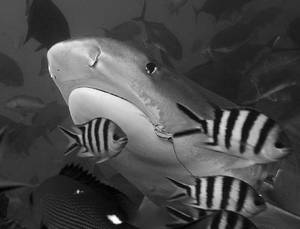Critter of the Month - Tiger Shark
Interview with
Those powerful and endangered predators, tiger sharks, feature as our Critter of the Month.

Find out more
The Worm lab
Tiger shark (Galeocerdo cuvier) info from the
Florida Museum of Natural History
Boris - My name is Boris Worm, I'm a marine biologist working out of Dalhousie University in Halifax, Nova Scotia, Canada. And the species I'd like to choose is the tiger shark.
It's a particularly large shark up to 7 metres in length. I find all sharks incredibly interesting and cool and I'm also concerned about them because a lot of the large sharks seem to be declining very rapidly throughout the ocean. Maybe one third of all sharks tend to be threatened by extinction and this is mostly due to the effects of fishing.
Sharks have survived for a very long time in the oceans. They have been around for probably more than 400 million years. That's more than twice as long as dinosaurs on average. And they tend to play an important role in the ecosystem.
Tiger sharks, for example, live worldwide in the tropics and the sub tropics. And it has been shown that whenever they show up in an ecosystem, for example in Shark Bay in Western Australia, they tend to rearrange the distribution of other animals. Dolphins, dugongs, sea turtles, even sea birds, do different things when a tiger shark is around. And the net result of that is that those species are feeding in different locations and this has ripple effects throughout the ecosystem.
For example sea turtles, which the tiger shark can prey on because it has very powerful jaws tend to not graze so much in interior of seagrass meadows and thereby those meadows can regenerated from the grazing pressure from those large grazers, much like wolves change the distribution of deer and other grazing animals on land.
So the tiger shark is just an incredible interesting and wild animal and I'm concernd for it because it is declining throughout much of its range.









Comments
Add a comment